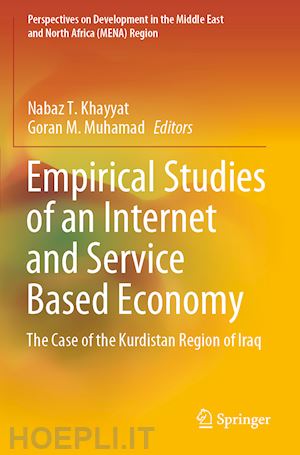
Questo prodotto usufruisce delle SPEDIZIONI GRATIS
selezionando l'opzione Corriere Veloce in fase di ordine.
Pagabile anche con Carta della cultura giovani e del merito, 18App Bonus Cultura e Carta del Docente
This book is a collection of eight studies covering several areas pertinent to the current technological and banking services situation in the Kurdistan region of Iraq. The economy of the Kurdistan Region of Iraq (KRI) is mainly dependent on oil revenue. The oil export revenue constitutes more than 90% of the government’s fiscal revenue. In addition to that, the public sector plays an excessive role in the economy, with public spending to GDP being over 70% while revenue from taxation constitutes less than 30% of total revenue.
As the economy is not diversified, there is a large gap between demand and supply of locally produced tradeable goods, leaving the KRI economy highly dependent on imports. Another structural challenge of the KRI economy is its dependence on cash and a weekly financial system. Although the region has witnessed extraordinary economic growth from 2008 to 2014, the growth rate decreased from 8 to 1 percent, trade and investment dropped to 5 percent, and the unemployment rate significantly increased to over 20% by the end of the year 2019. To maintain the progress of economic development, it is necessary to upgrade the country’s industrial structure in order to be able to generate more value-added products, which requires advancement in technological infrastructure to employ more sophisticated technologies.
There is not much written about Kurdistan and its economy, and yet there is a comprehensive development plan and resources to be used for education, research, rehabilitation, development, and reconstruction. As such, this book would be of interest to researchers, decision-makers, governmental and non-governmental organizations, undergraduate and graduate students, and the general public with an interest in the Middle East and contemporary Kurdish issues. It is a good up-to-date handbook for policymakers and NGOs involved in the rehabilitation, reconstruction, and development of Iraq.
Ch1 Assessing Innovation Capability and Technological Readiness for the KRG.- Ch 2 Examining Customer State Preferences of Mobile Services in the Kurdistan Region of Iraq.- Ch 3 Investigating the Factors affecting Mobile Money Adoption in the Kurdistan Region of Iraq.- Ch 4 Investigating the Determinant Factors of Telemedicine Adoption in the Kurdistan Region of Iraq.- Ch 5 Consumers’ Current State Preferences for Internet Banking Services.- Ch 6 Transferring Lean to Service: Application to the Kurdistan Banking Industry.- Ch 7 Adoption of Social Media in Small and Medium Enterprises in the Kurdistan Region of Iraq.- Ch 8 Online Reviews on Facebook and Their Influence on Customers’ Purchase Intention in the Kurdistan Region of Iraq Restaurants.
Nabaz Khayyat is an engineering economist with an MSc and a PhD in IT Engineering from Seoul National University (Seoul, South Korea). He has second PhD degree in Economics from Swiss Management University (Zurich, Switzerland). He is currently President of AWA Organization for Sustainable Development in Iraq, and working for the World Bank as a private sector specialist. He was Vice President for Academic Affairs, Knowledge University, and the Head of the Economics and Finance Department at the University of Kurdistan Hewler. He has also worked in the Faculty of Business at the University of Liverpool in the UK. Dr. Nabaz is very active in research and has published numerous books and articles in international journals. He also supervised numerous students in their master’s and Ph.D. studies at the University of Liverpool and the University of Kurdistan Hewler.
Goran M. Muhamad is an experienced economist with a M.Sc. in Economics from the University of Nottingham, UK, and a Ph.D. in Economics from University of Kurdistan Hewler. He has worked in academia, consultancy, and management in various industries. His research is internationally recognized focusing on a diversified range of subjects related to economics, with a particular focus on natural resource economics, private sector development, environmental economics, developing countries, and post-conflict affected areas











Il sito utilizza cookie ed altri strumenti di tracciamento che raccolgono informazioni dal dispositivo dell’utente. Oltre ai cookie tecnici ed analitici aggregati, strettamente necessari per il funzionamento di questo sito web, previo consenso dell’utente possono essere installati cookie di profilazione e marketing e cookie dei social media. Cliccando su “Accetto tutti i cookie” saranno attivate tutte le categorie di cookie. Per accettare solo deterninate categorie di cookie, cliccare invece su “Impostazioni cookie”. Chiudendo il banner o continuando a navigare saranno installati solo cookie tecnici. Per maggiori dettagli, consultare la Cookie Policy.